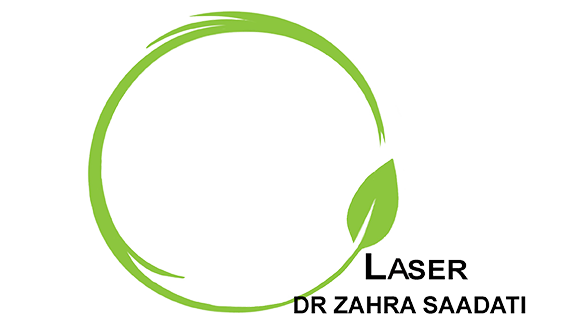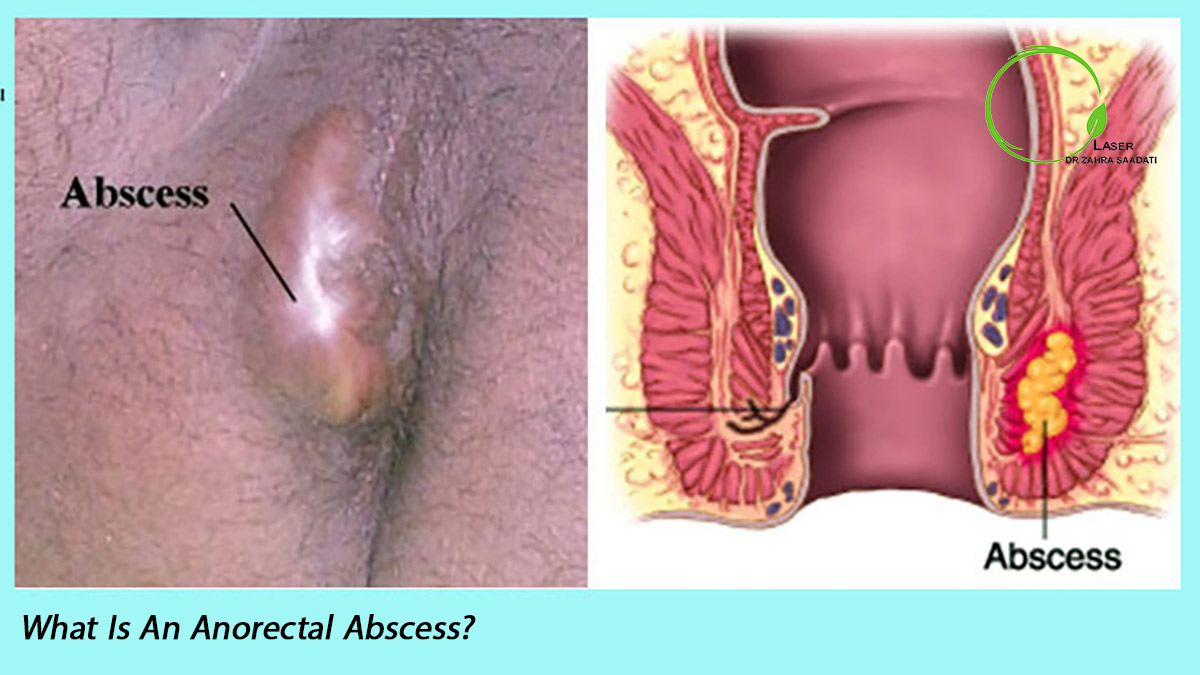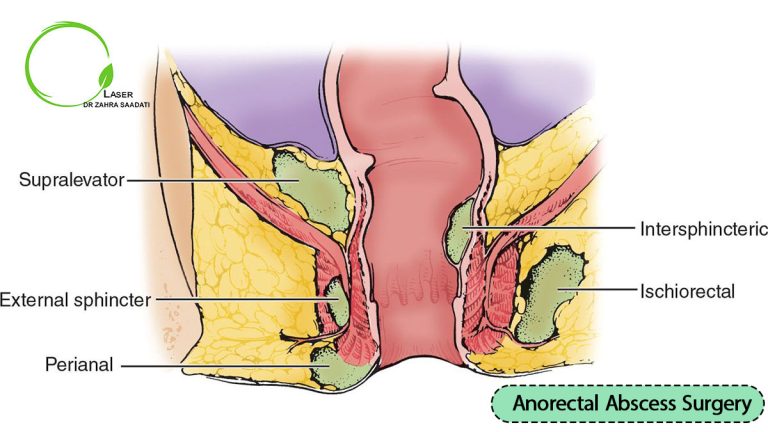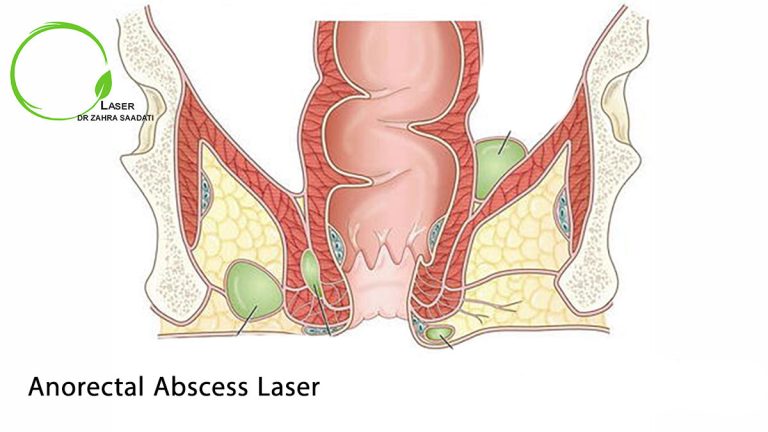An anorectal abscess, also known as perianorectal abscess and external abscess, refers to a painful condition in which a collection of pus develops near the anus. Most anorectal abscesses are a result of infection from small anal glands. That is why some patients name it an anal boil. An anorectal abscess causes severe pain, fatigue, fever, and rectal discharges.
Anorectal abscesses are less common; the main risk factors for anorectal abscesses are diabetes, Crohn’s disease, rectal disorders, corticosteroids, hemorrhoids, anal fissures, and anal fistula.
When an untreated anorectal abscess causes a skin track, it can turn into painful anal fistulas. In addition, untreated abscesses cause very severe pain in a way that the patient may need to undergo a surgical procedure.
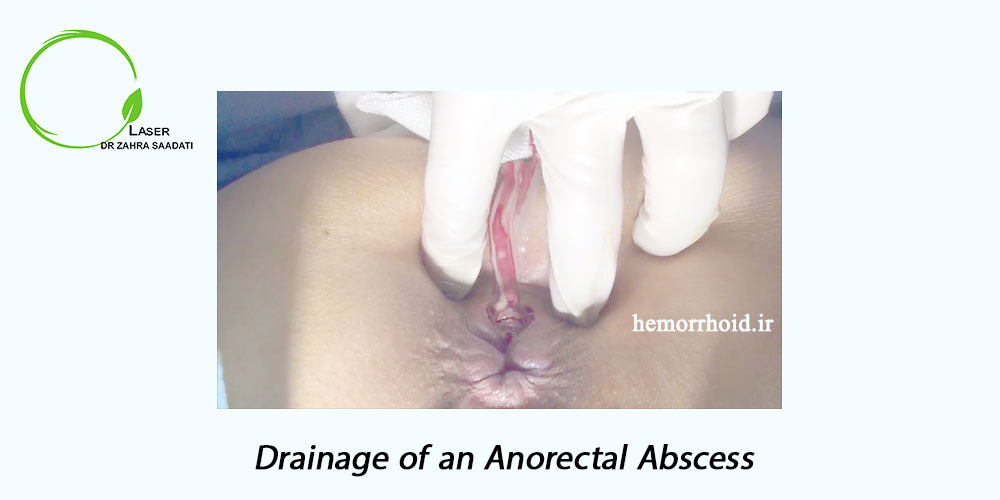
Types of anorectal abscesses:
Based on their anatomy, anorectal abscesses are classified into three groups:
- Perianorectal abscesses
- Ischiorectal abscesses
- Supralevator abscesses
About 60% of anorectal abscesses are perianorectal abscesses. A perianorectal abscess is caused by superficial collections of purulent discharges located under the skin of the anal canal. Ischiorectal abscesses form when suppuration transverses the external anal sphincter into the ischiorectal space.
Symptoms of anorectal abscesses:
The most common symptom of an anorectal abscess is constant anal pain, which may be aching or boring and accompanied by anal inflammation. The pain increases during bowel movements and then subsides. Some patients call an anorectal abscess an anal blister or anal boil because it is very painful and burning.
Other symptoms of anorectal abscesses are constipation, incomplete or difficult defecation, fever and chills caused by an infection, and a red swollen mass near the anus. Rectal discharges, bleeding, and skin redness and swelling around the anus are among other symptoms of an anorectal abscess. Patients with an anorectal abscess usually feel fatigued and have difficulty with urination.
An anorectal abscess can get very painful and worsen over several days. The pain may be initially scattered and limited but it gradually turns into a constant pain that worsens with changes in body position, such as standing, sitting, and turning. Although painful bowel movements are among the symptoms of anorectal abscesses, it is not true in all cases.
An anorectal abscess may also occur in the rectum, especially in patients with inflammatory bowel disease (IBD). In such cases, anorectal abscesses can cause abdominal pain or discomfort. In children, an anorectal abscess is characterized by pain and a lump around the anus.
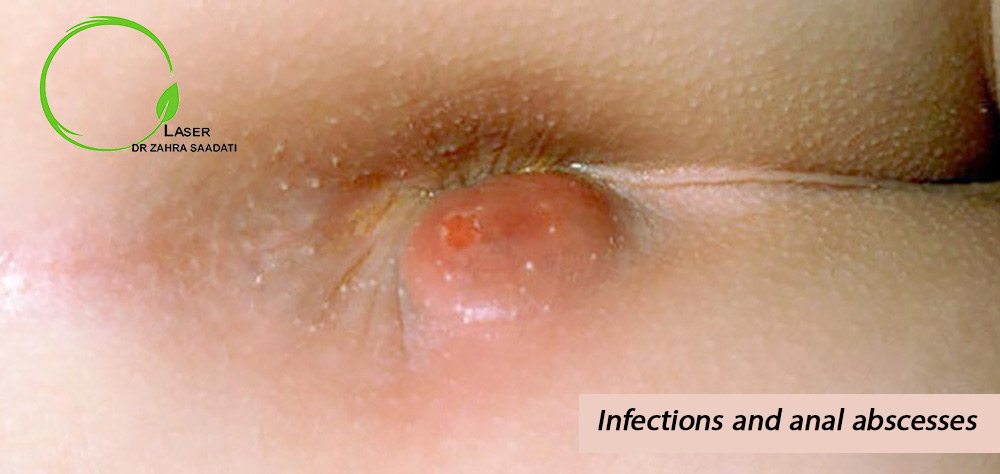
Differences between anorectal abscesses and hemorrhoids
An anorectal abscess causes purulent discharges and severe pain, whereas patients with hemorrhoids do not have purulent discharges and show no symptoms other than noticing a painful lump or bleeding (in some cases). In terms of shape, an anorectal abscess is bulged and inflamed but hemorrhoids appear as a skin tag. The pain caused by an anorectal abscess is significantly more severe than that of hemorrhoids, except for thrombosed hemorrhoids. This type of hemorrhoid is very painful and bruised.
What are the causes of anorectal abscesses?
Abscesses are usually caused by the accumulation of infections or a high density of common bacteria in the gastrointestinal tract for various reasons. Untreated anorectal abscesses may spread to other parts of the body such as the tonsils, rectum, and groin. In addition, untreated anorectal abscesses may turn into a general infection in the body that requires long-term treatments.
The main causes of an anorectal abscess are as follows:
- Blockage of anal glands
- Sexually transmitted infections
- Damage to healthy tissues of the body by an inflammatory bowel disease such as Crohn’s disease
- Diabetes
- Weakened immune system due to diseases such as AIDS
- Anal sex
- Current or recent chemotherapy
- Taking prednisolone or other steroids
- Constipation
- Diarrhea
- Young children or children with a history of anal fissures are at higher risk for anorectal abscesses. Children with a history of constipation may develop anal fissures.
Prevention of anorectal abscesses:
There are not many known ways to prevent anorectal abscesses. However, the following points help you prevent an anorectal abscess.
- Immediately treat any infection in the body
- Protect yourself against sexually transmitted infections (STIs)
- Use a condom during preliminary sex to prevent STIs
- Practice good hygiene of the anal area
Note that anorectal abscesses cause complications but they are treatable. Therefore, it is better to visit a physician once you notice an anorectal abscess.
Treatment of anorectal abscesses:
The basic principle of treatments for abscesses, especially anorectal abscesses, is the drainage of abscesses. Undoubtedly, you cannot get rid of anorectal abscesses with medications and anorectal abscess ointments. It is recommended to drain and remove an anorectal abscess using a laser because fine incisions and quick repair are very important in the treatment of anorectal abscesses considering the anal area conditions. Therefore, anorectal abscess laser is the best method for treating this disease with the minimum complications.
After draining and removing an anorectal abscess, the general surgeon and laser surgery specialist will prescribe you the right medications and ointments. You need to follow a high-fiber diet and drink plenty of water and liquids to experience easy defecation and prevent constipation. You should also take prescribed medicines and antibiotics on time.
Frequently asked questions (FAQs) about anorectal abscesses:
1-What kind of physician should we consult for the treatment of an anorectal abscess?
You need to visit a general surgeon to treat an anorectal abscess because the basic principle of treatments for anorectal abscesses is the surgical drainage and removal of abscesses. To get the best medical services for this purpose, it is recommended to visit a general surgeon and laser surgery specialist.
2-Is it possible to treat anorectal abscesses through medication?
Medication is a temporary solution to deal with anorectal abscesses and cannot definitively treat them. The definitive treatment for an anorectal abscess is abscess drainage by a surgeon. The patient is prescribed to take antibiotics or ointments before and after surgery as a supplement to the main treatment.
3-What should we do if an anorectal abscess bursts?
If an anorectal abscess bursts, you should immediately visit a general surgeon to drain and dry the abscess. In addition, sitting in a basin of warm water several times a day helps to reduce pain and inflammation. In case of severe infections, the specialist may prescribe you antibiotics.
4-What is the best treatment for anorectal abscesses?
The best treatment for an anorectal abscess is abscess drainage using a high-power laser. For this purpose, it is recommended to visit an experienced general surgeon and laser surgery specialist. The best treatment for an anorectal abscess should minimize the risk of recurrence and require a very short recovery period. Laser surgery helps you achieve these two goals.
5-Do anorectal abscesses heal on their own?
Superficial abscesses quickly heal in a very short period. However, the abscesses that occur in deeper layers and cause progressive pain need medical interventions. A general surgeon drains and dries the abscess to reduce the progressive and excruciating pain. Note that you should not manipulate an anorectal abscess.
6-Is it possible to treat an anorectal abscess with antibiotics?
Since the anal area is constantly active, diseases in this area should be addressed seriously. If you have a superficial anorectal abscess, you can improve your condition with medicine and antibiotics prescribed by a physician. However, the definitive treatment of anorectal abscesses is the surgical drainage and removal of the abscess. Depending on the extent and depth of the anorectal abscess, the physician may decide to perform conventional surgery or laser surgery.
7-What is the treatment of anorectal abscesses in women?
There is no difference between treatments of anorectal abscesses for men and women. However, women with an anorectal abscess are recommended to sit in a basin of warm water several times a day even during menstruation. Women should also keep the anal area clean and dry during this period. Women with an anorectal abscess are also recommended to reduce the pressure on the anal area and avoid getting pregnant.
8-Is an anorectal abscess serious?
An anorectal abscess is not inherently a serious condition and can be treated and controlled through medical interventions. However, if an anorectal abscess remains untreated and finally bursts, it can cause more abscesses and even an anal fistula. The infection may spread throughout the body in a way that is extremely difficult to control.
9-What is the difference between an anal cyst and an anorectal abscess?
An anorectal abscess is also known as an anal boil because it is highly inflamed, infectious, and painful. Cysts usually do not occur in the anal area, and patients mistakenly call hemorrhoids or anorectal abscesses as anal cysts.
10-What are the home remedies for anorectal abscesses?
There is no home remedy to definitively treat anorectal abscesses. Home remedies can only help patients to reduce the pain and inflammation caused by an anorectal abscess. The best home remedies for this purpose are sitting in a basin of warm water several times a day, using soft pillows for sitting on hard surfaces, following a high-fiber diet, drinking plenty of water and juices, and using a hot water compress.
